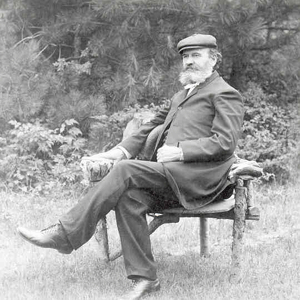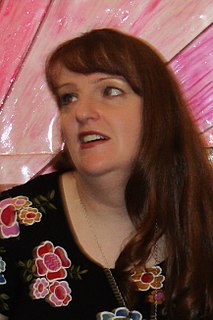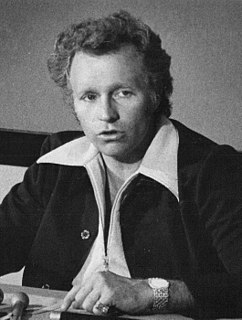A Quote by Cat Stevens
I looked at some of the statues of Jesus; they were just stones with no life. When they said that God is three, I was puzzled even more but could not argue. I believed it, simply because I had to have respect for the faith of my parents.
Related Quotes
I think the fault is more with historicists who have stubbornly failed to develop a good theory of historicity. By simply resting on the feeble laurels of prima facie plausibility ('Jesus existed because everyone said so') and subjective notions of absurdity ('I can't believe Jesus didn't exist!'), the existence of Jesus has largely been taken for granted, even by competent historians who explicitly try to argue for it.
A friend ... said, "You were healed by faith." "Oh, no," I said, "I was healed by Christ." What is the difference? There is a great difference. There came a time when even faith seemed to come between me and Jesus. I thought I should have to work up the faith, so I laboured to get the faith. At last I thought I had it; that if I put my whole weight upon it, it would hold. I said, when I thought I had got the faith, "Heal me." I was trusting in myself, in my own heart, in my own faith. I was asking the Lord to do something for me because of something in me, not because of something in Him.
There will be ups, there will be downs, there will be sideways. I can just tell you I have been hired, I have been fired, I have been lauded, I have been vilified. I've said some of the most brilliant things that just by accident appeared on my tongue, and I've said some of the dumbest things that you could imagine. But each day - even the day that I knew I was going to be fired - I looked forward to because I've always believed that tomorrow was going to be the best day of my life.
You see, this people [Noah, Abraham, Sarah, Jacob, etc.] simply believed that God existed in the situation they were faced with, and they trusted Him rather than themselves. The result? God said, "That pleases Me." They were men and women just like you and I, which is the most encouraging part of all. We don't find golden haloes, or perfect backgrounds, or sinless lives, we just find people. People who failed, who struggled, who doubted, who experienced hard times and low times in which their faith was eclipsed by doubt. But their lives were basically characterized by faith.
I had a very marginal understanding of what faith in God was growing up because, although I went to a Catholic school, without having parents who really were actively involved in faith there was no reinforcement of it. So, as a result of that I guess I just kind of thought that God was somebody that you put in a box and you put Him on a shelf and you called on him when you had crises.
I want to help you," Oliver said. "Why?" Galen looked up at him. "Because of Petunia?" Oliver was relieved that the prince didn't seem to be skeptical about his conviction. He simply looked like he wanted to know, and so did Heinrich, when Oliver dared to look at the other prince. Oliver was very aware that Heinrich had known his father. Had known him better than Oliver had, in fact. "Because of her," Oliver said at last. "Even though I have only met her twice, really...I just..." "I risked my life to save Rose after only speaking with her twice," Galen said with a small smile.
Jack believed in something—he believed in white witches and sleighs pulled by wolves, and in the world the trees obscured. He believed that there were better things in the woods. He believed in palaces of ice and hearts to match. Hazel had, too. Hazel had believed in woodsmen and magic shoes and swanskins and the easy magic of a compass. She had believed that because someone needing saving they were savable. She had believed in these things, but not anymore. And this is why she had to rescue Jack, even though he might not hear what she had to tell him.
Old Testament Israel had some foundational pillars of faith. They were true and robust and God given. The trouble was that people had come to trust in them merely by repeating them, without paying any attention to the ethical implications of what their faith should mean in how they lived. They believed God had given them their land. He had. But they had not lived in it in either gratitude or obedience. They had not fulfilled any of the conditions that Deuteronomy had made so clear.
In California, Jim Jones even staged a shooting of himself. The lesson of this was two-fold. One, that he was a god - he could heal himself. He had these magic powers. A large segment of his congregation came from a Pentecostal tradition that believed in faith healing and already believed Jones had the power to cure others. And two, the "shooting" made him seem important. Civil rights leaders were being gunned down - MLK, Jr., Medgar Evers, Malcolm X - and he longed to be considered as heroic and important as they were.
Beyond the earliest days of the religion, early Christians were believers because they'd been converted, not because they were witnesses to supernatural events, just like today. The 9/11 hijackers believed in Paradise for martyrs, but that doesn't mean that that's true. We have no good reason to imagine that eyewitnesses wrote the gospels rather than someone simply documenting the Jesus story as it had developed within their church community.
The Jews believed they were the nation God had chosen among all the nations. And they were. But that did not give them immunity to God's judgment. Like the nations, they too would feel God's wrath if they refused to live in God's ways. Furthermore, God could deal with other nations in mercy as well as judgment. Jeremiah was full of surprises, as against the popular religious assumptions of his day. That's perhaps why some people, when they encountered Jesus, thought he was very like Jeremiah. He turned things upside down.
I don't know what in the world happened. I don't know if it was the power of the prayer or God himself, but it just reached out, either while I was driving or walking down the sidewalk or sleeping, and it just - the power of God in Jesus just grabbed me... All of a sudden, I just believed in Jesus Christ. I did, I believed in him!
I suppose if I had said television was more popular than Jesus, I would have gotten away with it. I'm sorry I opened my mouth. I'm not anti-God, anti-Christ, or anti-religion. I wasn't knocking it or putting it down. I was just saying it as a fact and it's true more for England than here. I'm not saying that we're better or greater, or comparing us with Jesus Christ as a person or God as a thing or whatever it is. I just said what I said and it was wrong. Or it was taken wrong. And now it's all this.
What is God like? Because millions and millions of people were taught that the primary message - the center of the Gospel of Jesus - is that God is going to send you to hell, unless you believe in Jesus. And so, what gets, subtlely, sort of caught and taught is that Jesus rescues you from God. But what kind of God is that; that we would need to be rescued from this God? How could that God ever be good; how could that God ever be trusted? And how could that ever be good news.


































